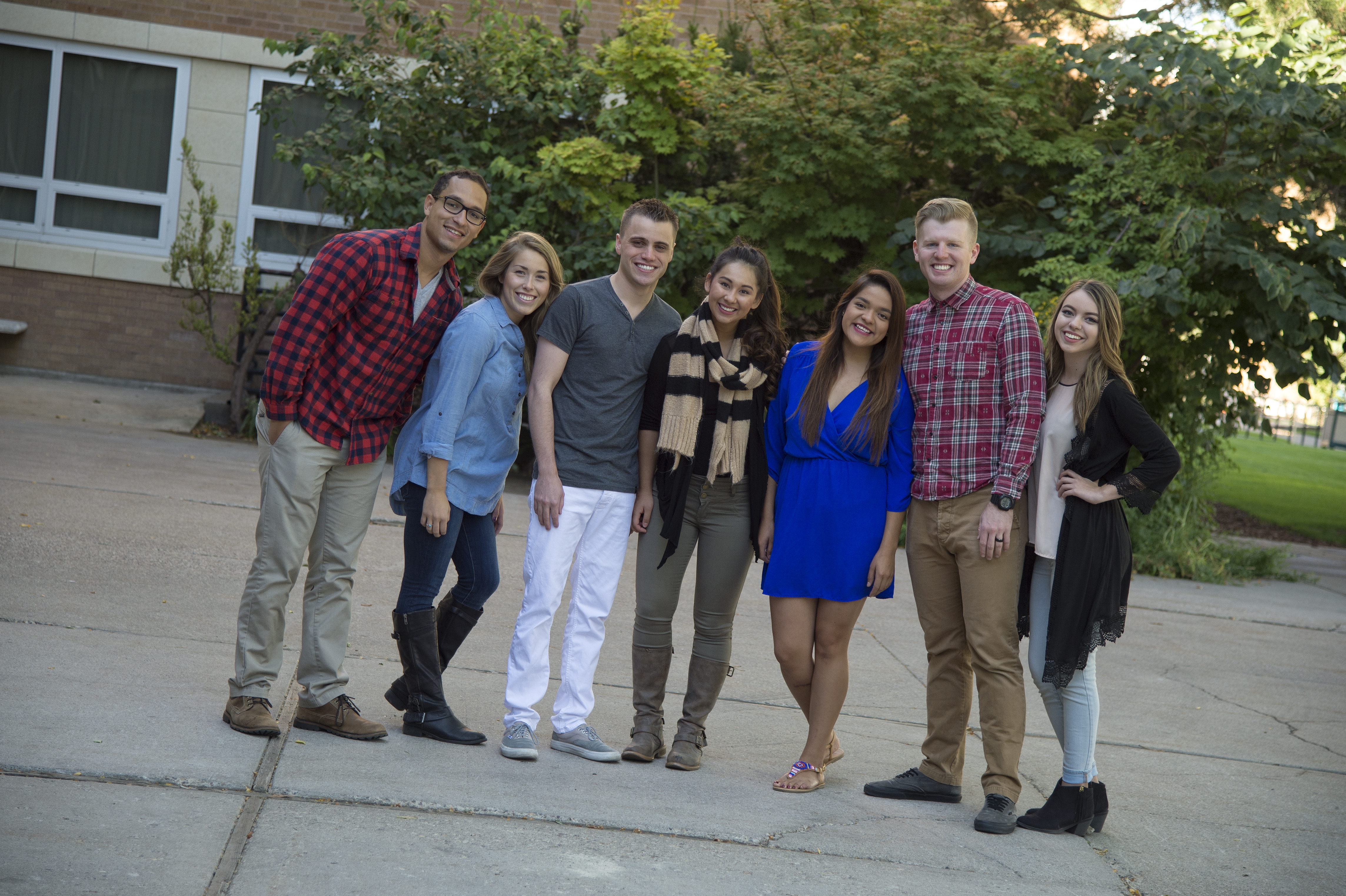General Resources
.jpg)
The following links are provided for your information only. We do not specifically endorse any service or information provided on the internet. Self-help resources can be great to accompany work you are doing in therapy or in a support group. We do not necessarily recommend self-treatment as a sole course of treatment. If you are interested in talking with a counselor at the ISU Counseling and Mental Health Center, call us at (208) 282-2130.
An important part of self-care is utilizing resources that can assist you in understanding yourself better and improving your quality of life. Many find that self-help books are a helpful compliment to receiving in-person counseling services. The CMHC self-guided resource library page includes a list of recommended resources on topics relevant to mental health and wellness that are available through ISU libraries that you may find helpful in improving your well-being. Topics include, but are not limited to, ADHD, grief, mindfulness, racism, substance use, and trauma.
- SAMHSA's National Helpline 1-800-662-HELP (4357) is a free, confidential, 24/7, 365-day-a-year treatment referral and information service for individuals and families facing mental and/or substance use disorders.
- Narcotics Anonymous (NA) provides support based around sharing and listening to personal stories from individuals struggling with substance use, and includes information about meetings in the Pocatello area. For more information about NA, call 1-800-407-7195.
- The National Institute on Drug Abuse (NIDA) is the lead federal agency supporting scientific research on drug use and its consequences.
- The JED Foundation empowers young adults transitioning into adulthood with skills and support to grow into healthy thriving adults.
- ULifeline is an online resource providing support for a variety of mental health issues affecting college students.
- National Suicide Prevention Lifeline 1-800-273-8255 provides 24/7, free and confidential support for people in distress, prevention and crisis resources for you or your loved ones, and best practices for professionals.
- Idaho Suicide Prevention Hotline 1-208-398-4357 provides 24/7, free and confidential support for people in distress. Their goal is to help you reduce stress and feel empowered to make decisions. Through listening, they empower Idahoans with options and resources while inspiring hope.
- Rape, Abuse, & Incest National Network (RAINN) operates the National Sexual Assault Hotline 800-656-HOPE (4673). Calling the National Sexual Assault Hotline gives you access to a range of free services including:
- Confidential support from a trained staff member
- Support finding a local health facility that is trained to care for survivors of sexual assault and offers services like sexual assault forensic exams
- Someone to help you talk through what happened
- Local resources that can assist with your next steps toward healing and recovery
- Referrals for long term support in your area
- Information about the laws in your community
- Basic information about medical concerns
- National Sexual Violence Resource Center (NSVRC) provides information and tools to prevent and respond to sexual violence. Learn essential information about sexual assault and ways to heal from sexual violence.
- MaleSurvivor provides an online community for men who have experienced sexual assault or abuse to come together to find support, information, and hope. MaleSurvivor facilitates dialogues among survivors and provides educational resources to help empower men.
- Idaho Legal Assistance provides civil legal services for survivors of sexual violence throughout Idaho. Services available include those that will enhance survivor safety and privacy, ensure access to education, and help survivor’s navigate complex immigration, housing, public benefit, employment, and criminal justice system involvement related to victimization.
- Family Services Alliance of Southeast Idaho (Pocatello & Soda Springs) offers a variety of support services at no cost including a 24-hour Crisis Hotline (208) 251-HELP (4357), emergency shelter, counseling and play therapy, victim advocacy, and support groups for survivors of abuse.
- Faces of Hope Victim Center (Boise) offers support services at no cost including crisis counseling, follow-up medical care, forensic exams, safety planning, protection orders, empowerment classes, support groups, and self-defense classes.
Tragedies disrupt our sense of what is normal and often leave us uncertain about how to move forward. Review this Coping with Loss handout to learn healthy actions to help you gain strength and healing.
Review these tips from HelpGuide to learn healthy ways to deal with the grieving process.
Being autistic can be accompanied by unique challenges. Interactions with the world may be different from your peers, which can lead to feeling alone. Difficulties may occur in making friends or navigating the dating world, and conversations and social interactions might be overwhelming and contribute to feelings of social anxiety. Meeting deadlines, finishing assignments, and navigating college life can also be very challenging. The Big Autistic Resource Guide provides many resources for people identifying as autistic, including social media, mental health resources, podcasts, books, and organizational tools.

Campus Resources
ISU has a number of resources to help you on your academic journey. We are here to help you every step of the way. When you first come to ISU, take some time to familiarize yourself with all of the resources here on campus. Once you get started on your search, you will be surprised by how many programs and resources are available to help you.
The Student Success Center offers some great resources for helping students achieve academic success while here at ISU. Some of the services offered include tutoring and courses for success:
- Math tutoring through the Math Center
- Writing feedback and support through the Writing Center
- Content area tutoring
- Courses for success help first year students with the transition to college, develop learning and self-management strategies, and learn important academic skills.
The Career Center offers a number of services to help prepare students for professional development including career counseling and assessment, resume resources, and ways to improve your interviewing skills.
ROAR 1199 Course is a 3-credit academic elective designed to ensure that students who start college can reach their goals with the least cost and in the time frame that best suits their needs. ROAR 1199 takes a holistic approach to helping students make a strong, successful transition to higher education. In this course students will learn how to actively use their brain's ability to not only learn and adapt, but to also handle the challenges and failures that are a part of productive learning. Students will also examine their goals, including their major and career options, develop financial literacy, develop strategies for personal wellness and connection, receive training in research and information literacy fundamentals, and gain a greater awareness of the resources that are available to them and how to access what they need.
Disability Services is dedicated to creating an accessible environment for students, employees, and community members with disabilities. Please reach out to them to update accommodations for any physical, intellectual, and/or emotional disability you may be experiencing. It is important to note that depression and anxiety are considered disabilities that qualify for certain accommodations.
Intensive English Institute (IEI) provides English language instruction for international students who wish to study in a comprehensive, academically, rigorous program.
Time Management and Organization
All students and faculty at ISU have access to Google Suite (G Suite), which allows users to connect, share, and collaborate anytime and anywhere, on any device. In addition, students and educators can download Microsoft 365 for free. All you need is your ISU email to get started.
The ISU IT website explains the many different types of tools available, with links to instructional materials on each. Below are some additional instructional videos to help you become more familiar with all of the great features offered by Google, Microsoft, and Zoom:
- Introduction to G Suite
- Gmail Tips and Tricks
- How to use Gmail Filters like a Pro
- Three Filters Every Gmail User Should Know
- Google Drive Tutorial
- 7 Google Drive Tips Every Use Should Know
- Organizing Google Drive Files
- Google Docs Tutorial
- Google Slides Tutorial
- 5 Google Sheets Tips Every User Should Know
- Top 20 Microsoft Excel Tips and Tricks
- Microsoft Powerpoint Tutorial
- Microsoft OneDrive Tutorial
- Top 20 Zoom Tips and Tricks
Time Management: Good time management allows you to accomplish more in a shorter period of time, which leads to more free time, helps you focus, and lowers your stress. Check out this video on time management and scheduling to learn how to implement this skill into your life. Download this Customizable Weekly Schedule to help you get organized and manage your time more efficiently.
Avoid Procrastination: Learning how to avoid procrastination and build motivation is an important skill to learn, and will benefit you throughout your college career. This video will help you learn ways to break down large tasks, find purpose in regular daily activities, and avoid patterns that feed procrastination habits.
Work Efficiently: A great tool for boosting efficiency is the Tomato Pomodoro Timer method. This method allows you to organize your tasks and take regular breaks. It has been shown to increase productivity so you can actually get more done in a shorter amount of time. You can also download the app for the pomodoro timer here.

Mindfulness: Mindfulness is a simple practice that helps you engage with the present moment, observe emotions and thoughts in a compassionate and nonjudgmental way, and increase awareness of your breath as a tool to calm your body's physiological responses and intense emotions. The benefits of practicing mindfulness for a few minutes each day are numerous and include decreased stress and anxiety, boosting memory, better sleep, and more focused attention.
Explore the ISU Mindful YOUniversity webpage to find information on mindfulness groups and resources on campus, online guided meditations by ISU faculty and students, and courses on mindfulness offered to students, staff, and community members.
There are many mindfulness resources available. Try some of these free guided practices to get started:
- Breathing meditation (5 min)
- Body scan meditation (3 min)
- Meditation for sleep (13 min)
- Progressive muscle relaxation (11 min)
- Meditation for focus (10 min)
- Free playlist with 52 guided meditations on SoundCloud
There are also many great mindfulness apps to choose from. Many of them have free trials with paid subscriptions. Here are some of the most popular apps:
Breathing Exercises: One tool that is free and always readily available to us to relieve stress is our breath. Research has shown breathing exercises to be an immediate and effective holistic response to help with emotion regulation. The Counseling and Mental Health Center offers Biofeedback services wherein you can practice diaphragmatic breathing and actively watch your nervous system regulate in response.
Labeling Your Emotions: An important skill of emotional intelligence and resilience is the ability to label and articulate the emotions that we feel. Our emotions are vast and involve much more than just happiness, anger, fear, sadness, and disgust. This Emotion Wheel will help give you an expanded vocabulary to label your emotions so you can better understand them and process them in a healthy, adaptable way.
Awareness of Thoughts: Our minds have a tendency to gravitate toward the negative and focus on that. Try shifting your thinking toward things that bring feelings of happiness, contentment, and satisfaction. Increase awareness of positive emotions and pleasant moments by tracking them using this Pleasant Moments Calendar.
Check out these additional resources to learn more information on strategies to build positive emotions and improve your emotional well being.

Healthy Diet: Having a healthy, well-balanced diet can help boost your mood, energy level, and cognitive functioning. Avoid getting overwhelmed by trying to make major changes to your diet. Rather than opting for a major overhaul of your current eating habits, remember that small and simple adjustments can have a beneficial and long lasting impact. Here are some tips to help you establish and maintain a healthy diet.
- Avoid extreme dieting and instead work towards balance and moderation.
- Make sure you have a balance of protein, healthy fats, carbohydrates, fiber, vitamins, and minerals.
- Avoid sugary drinks.
- Drink plenty of water every day.
- Replace unhealthy trans fats with healthier options (i.e. grilled salmon instead of fried chicken).
- Eat a healthy breakfast every day.
- Limit snacking throughout the day.
- Slow down and practice mindful eating.
- Read labels and know the serving size and exactly what you are eating.
- Replace sugary desserts with fresh fruit.
- Get creative and have fun trying out new recipes.
ISU offers nutritional/wellness coaching to all students, staff, faculty, alumni, and spouses of students, staff, and faculty through the wellness center. Call today to make an appointment.
To learn more about healthy eating check out these resources:

Exercise: Research shows that having a regular and consistent exercise routine can have a significant benefit for overall mental and emotional health. Here are some of the many benefits of exercise:
- Boost mood
- Improve sleep
- Boost cognitive functioning and memory
- Increase energy
- Helps combat depression, anxiety, and stress
- Lose weight, build muscle
To learn more about the benefits of exercise, check out this article.
Rather than reinventing the wheel, find something that you already enjoy doing and go with it. This could include yoga, swimming, walking, biking, hiking, dancing, or another activity that gets you feeling good while increasing your heart rate. For an added emotional boost turn up your favorite music and grab a buddy to work out with you.
The Wellness Center is offering in-person Get Fit classes throughout the spring semester. They have a variety of classes offered (in-person and virtual) at different times throughout the day, Monday-Friday. Registration is required.

Sleep: Getting adequate, quality rest can make a huge difference in your mood, energy level, and productivity. Here are some tips on how to get a better night's rest:
- Establish and maintain a regular bedtime and a regular rising time. Try to maintain a regular rising time even if you have had trouble sleeping the night before. This will keep you in sync with your natural circadian rhythms.
- Reserve your bedroom for sleep. When you get into bed, turn off the lights and try to get to sleep. If restless, get up instead of tossing and turning in bed.
- Exercise regularly during the day so that your body feels tired enough to want rest at bedtime. If you do not get enough exercise, try taking a walk a few hours before bedtime.
- Eat a well-balanced diet. Studies have shown that diets deficient in certain nutrients, particularly copper, iron, and aluminum, can cause disruptions in sleep patterns.
- Take a warm bath (not a brisk shower) just before bedtime to help you relax.
- Prepare your sleeping environment. Make sure that your bed is comfortable and that you are neither too hot nor too cold. Most people sleep best when the temperature is 60-65 degrees Fahrenheit. The bedroom should provide maximum comfort and minimum distraction.
- Learn relaxation techniques such as deep breathing exercises.
- Determine your optimal amount of sleep. Systematically work toward obtaining the right amount of sleep each night.
- If you are having trouble sleeping, talk to your doctor because it may be related to another problem such as a thyroid issue or sleep apnea.
- Avoid the following:
- Napping during the day or evening
- Exercising vigorously in the evening
- Drinking caffeinated beverages (coffee, tea, soft drinks) in the evening
- Eating heavy or spiced food in the evening
- Eating late-evening meals or drinking large quantities of liquids late in the evening
- Blue light/bright screens 1-2 hours before bedtime
For more information on creating healthy sleep habits please refer to these resources:
- Help Guide: Getting Better Sleep
- Healthline: Proven Tips to Sleep Better at Night
- Sleep Education: Healthy Sleep Habits
- Sleep Foundation: Sleep Hygiene

Building connections and strengthening social relationships is an important part of attending college. Social wellness contributes to a more positive campus experience by helping students:
- Develop a sense of identity and belonging on campus
- Establish healthy relationships based on mutual respect and support
- Foster a sense of community through campus involvement
- Build sensitivity and awareness of others
- Encourage appreciation for diversity
- Develop interpersonal and professional communication skills
- Establish healthy boundaries with others
ISU Social Wellness Resources:
- CMHC Connections groups
- Student organizations and clubs
- Campus Recreation
- Virtual Wellness Resources
Community Resources:
More Resources on Social Wellness:
.jpg)
The college experience gives you valuable firsthand experience in developing financial literacy. It's important to learn the basics to avoid financial hardships and stress that comes along with it.
- Creating a budget (and sticking to it). Here are some apps to help you get started.
- Opening a checking account with a debit card
- Using a credit card wisely. Check out this article to learn how to build credit as a student.
- Learning how to save and invest
- Learning how to file your taxes. Read this article to learn some tax tips.
- Taking advantage of the perks of being a student
Financial Resources Available to Students:
- This Financial Education Platform with interactive modules will help you develop a greater understanding of things you need to know related to financial planning and wellness.
- The Bengal Meal Share is a program that helps students with food insecurity. Students can donate meals, funds, or request meal assistance.
- Emergency funds and scholarships are also available to students who experience financial emergencies that would otherwise prevent them from continuing their education.
- The ISU Financial Aid Office can answer your questions and help you figure out what type of aid you may be eligible to receive.
- For scholarship information, please visit ISU's Scholarship Office.
- Benny's pantry assists students experiencing hardships by providing them with access to nutritious food. Contact them to set up an appointment to shop, donate, or volunteer.
- Beginning January 2021 the ISU College of Business Finance Program will be offering a 9 credit Bengal Financial Literacy Program which will be open to students. Students will receive a certificate in financial literacy upon completion of the program.
- The Bengal Financial Literacy Show with Chris Chatwin and Doug Chambers of ISUCU is a financial education podcast offered on the first Friday evening of every month throughout the winter semester.
- Check out these other great resources for ideas on how to build your skills of financial literacy:
Contact the Office of the Dean of Students through this submission form regarding complaints, concerns, or other matters. This form is provided as a reporting option for matters that will be addressed through university procedures and shared with the appropriate staff members and departments.
You may also anonymously report concerns by calling 1-800-716-9007 or by visiting Convercent 24 hours a day, seven days a week. Convercent is a hotline operated by a third party which forwards reports anonymously to ISU's internal audit director and general counsel. If the report is submitted to the hotline, it is possible for the reporting party to communicate anonymously with these officers as the report is investigated.
Concerns related to safety or security should be reported to ISU Department of Public Safety at (208) 282-2515

